Business Social Responsibility Report: Key Concepts and Analysis
VerifiedAdded on 2021/02/20
|8
|951
|23
Report
AI Summary
This report provides an overview of the social responsibility of businesses, covering key concepts discussed in three seminars. Seminar 1 defines social media and its impact on businesses, along with an explanation of Corporate Social Responsibility (CSR) and its importance. It also highlights the difficulties faced by Small and Medium Enterprises (SMEs) in implementing social media and CSR strategies. Seminar 2 focuses on global sustainable development, exploring its link to CSR and the importance of sustainable practices for SMEs, while also mentioning the challenges faced by SMEs. Seminar 3 discusses whistleblowing, its impact, and workplace ethics, along with potential conflicts arising from whistleblowing. The report concludes with a list of references used.
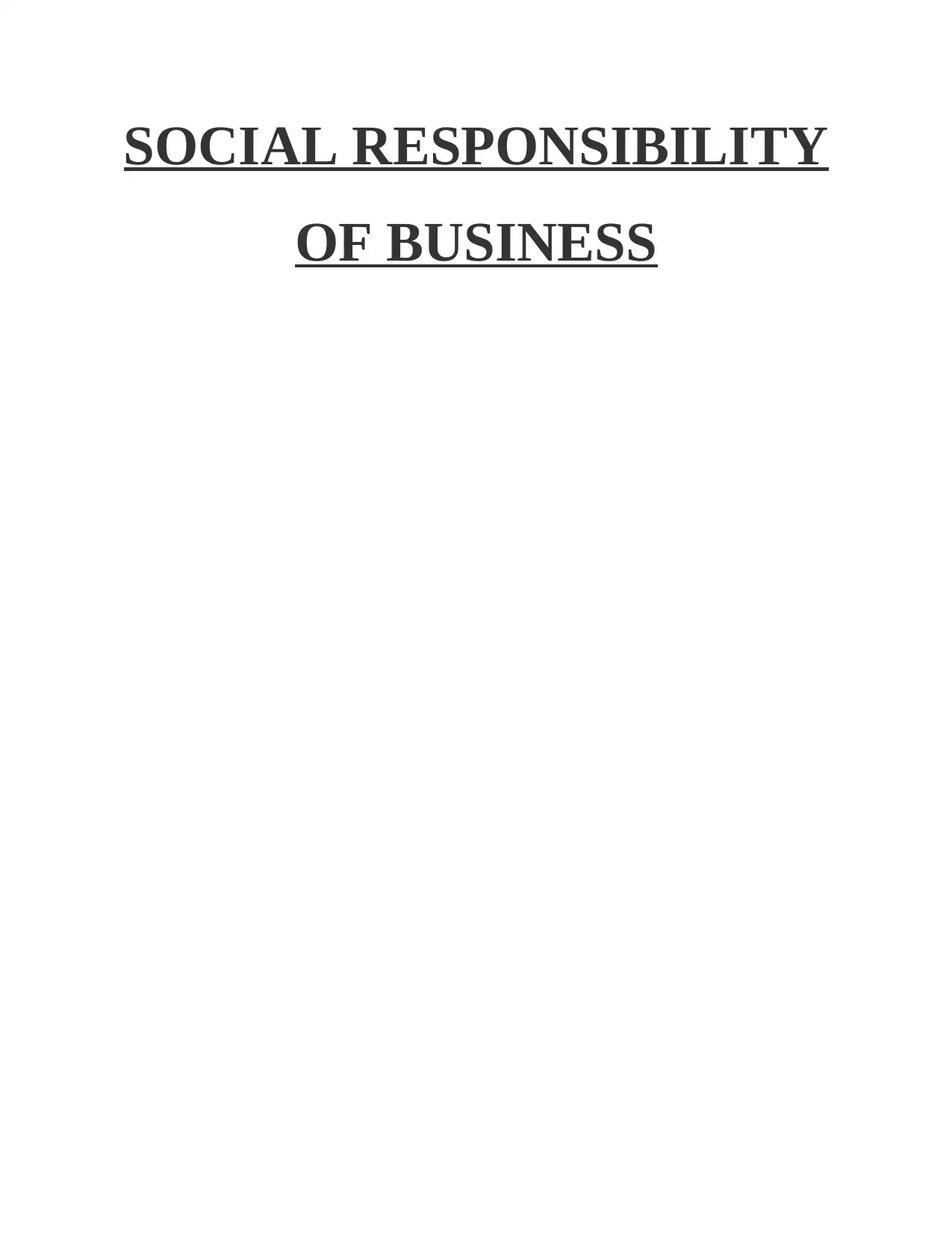
SOCIAL RESPONSIBILITY
OF BUSINESS
OF BUSINESS
Paraphrase This Document
Need a fresh take? Get an instant paraphrase of this document with our AI Paraphraser
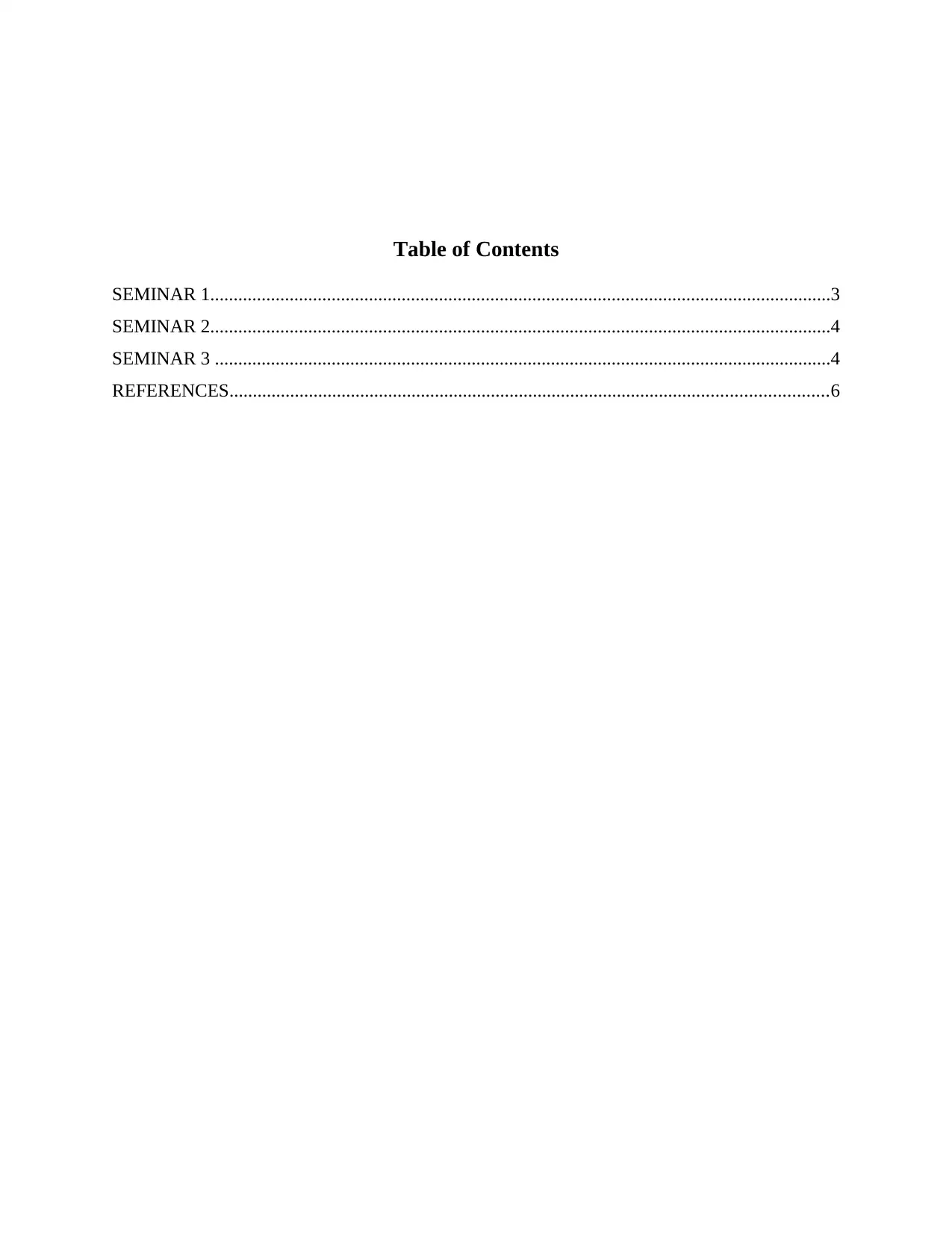
Table of Contents
SEMINAR 1.....................................................................................................................................3
SEMINAR 2.....................................................................................................................................4
SEMINAR 3 ....................................................................................................................................4
REFERENCES................................................................................................................................6
SEMINAR 1.....................................................................................................................................3
SEMINAR 2.....................................................................................................................................4
SEMINAR 3 ....................................................................................................................................4
REFERENCES................................................................................................................................6
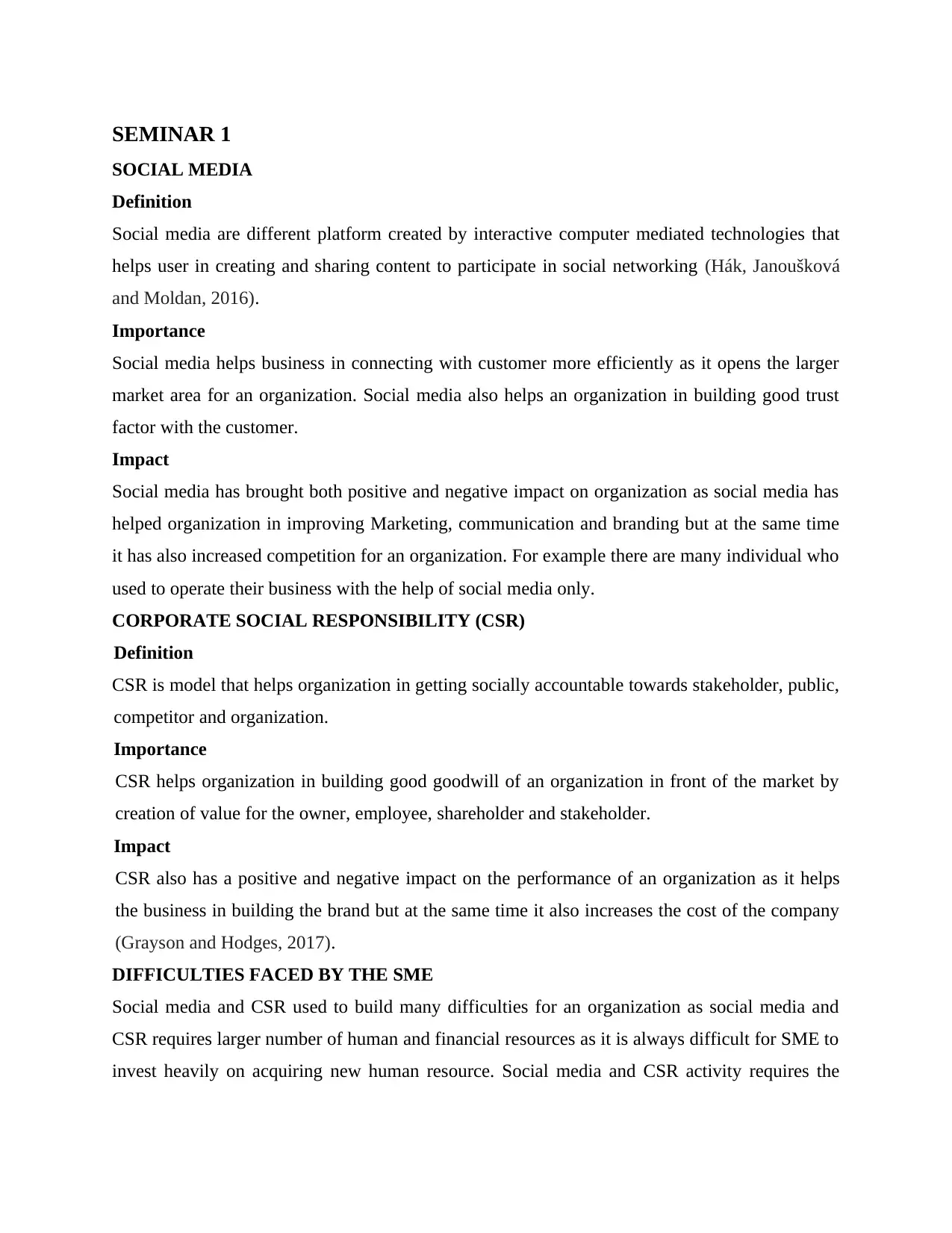
SEMINAR 1
SOCIAL MEDIA
Definition
Social media are different platform created by interactive computer mediated technologies that
helps user in creating and sharing content to participate in social networking (Hák, Janoušková
and Moldan, 2016).
Importance
Social media helps business in connecting with customer more efficiently as it opens the larger
market area for an organization. Social media also helps an organization in building good trust
factor with the customer.
Impact
Social media has brought both positive and negative impact on organization as social media has
helped organization in improving Marketing, communication and branding but at the same time
it has also increased competition for an organization. For example there are many individual who
used to operate their business with the help of social media only.
CORPORATE SOCIAL RESPONSIBILITY (CSR)
Definition
CSR is model that helps organization in getting socially accountable towards stakeholder, public,
competitor and organization.
Importance
CSR helps organization in building good goodwill of an organization in front of the market by
creation of value for the owner, employee, shareholder and stakeholder.
Impact
CSR also has a positive and negative impact on the performance of an organization as it helps
the business in building the brand but at the same time it also increases the cost of the company
(Grayson and Hodges, 2017).
DIFFICULTIES FACED BY THE SME
Social media and CSR used to build many difficulties for an organization as social media and
CSR requires larger number of human and financial resources as it is always difficult for SME to
invest heavily on acquiring new human resource. Social media and CSR activity requires the
SOCIAL MEDIA
Definition
Social media are different platform created by interactive computer mediated technologies that
helps user in creating and sharing content to participate in social networking (Hák, Janoušková
and Moldan, 2016).
Importance
Social media helps business in connecting with customer more efficiently as it opens the larger
market area for an organization. Social media also helps an organization in building good trust
factor with the customer.
Impact
Social media has brought both positive and negative impact on organization as social media has
helped organization in improving Marketing, communication and branding but at the same time
it has also increased competition for an organization. For example there are many individual who
used to operate their business with the help of social media only.
CORPORATE SOCIAL RESPONSIBILITY (CSR)
Definition
CSR is model that helps organization in getting socially accountable towards stakeholder, public,
competitor and organization.
Importance
CSR helps organization in building good goodwill of an organization in front of the market by
creation of value for the owner, employee, shareholder and stakeholder.
Impact
CSR also has a positive and negative impact on the performance of an organization as it helps
the business in building the brand but at the same time it also increases the cost of the company
(Grayson and Hodges, 2017).
DIFFICULTIES FACED BY THE SME
Social media and CSR used to build many difficulties for an organization as social media and
CSR requires larger number of human and financial resources as it is always difficult for SME to
invest heavily on acquiring new human resource. Social media and CSR activity requires the
⊘ This is a preview!⊘
Do you want full access?
Subscribe today to unlock all pages.

Trusted by 1+ million students worldwide
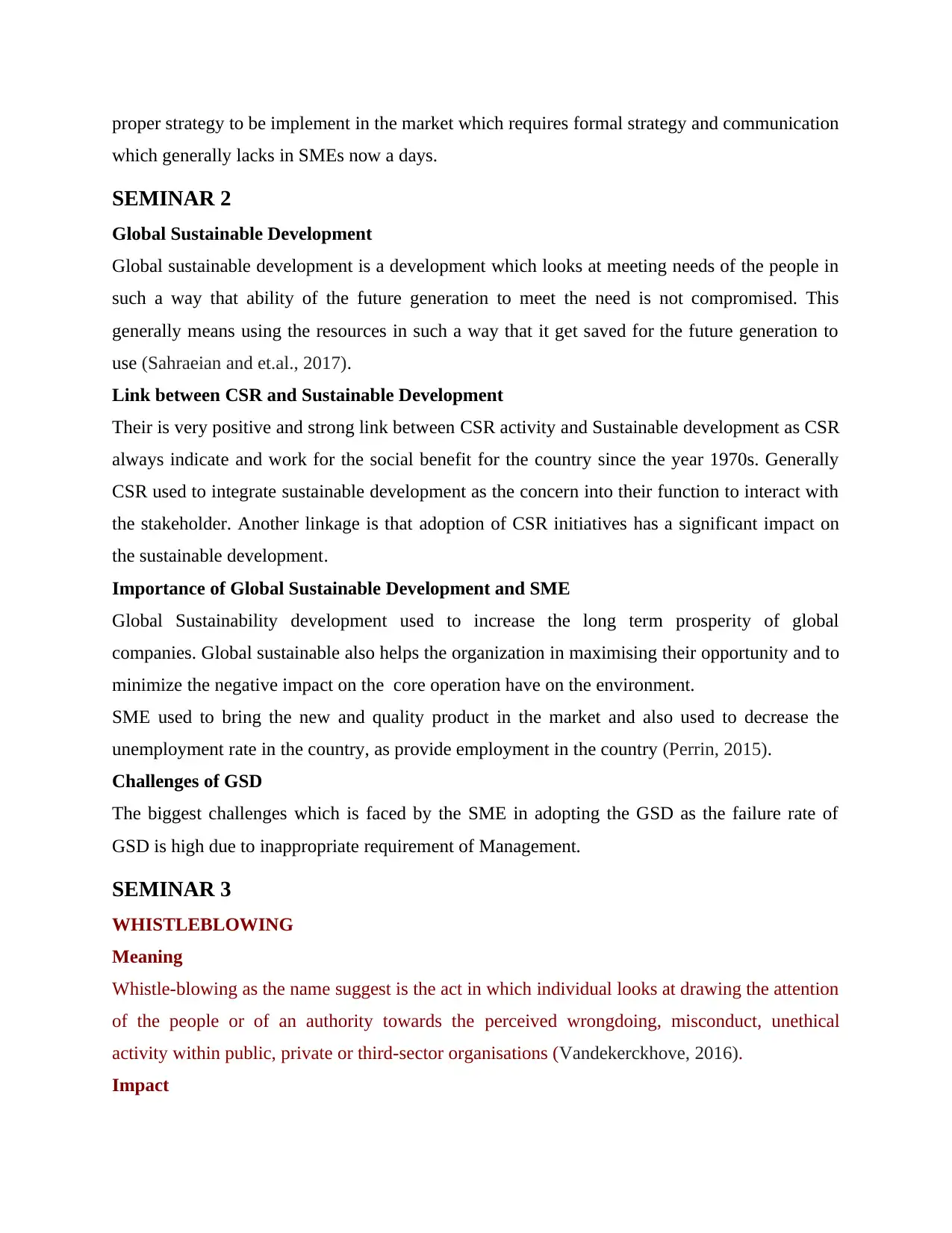
proper strategy to be implement in the market which requires formal strategy and communication
which generally lacks in SMEs now a days.
SEMINAR 2
Global Sustainable Development
Global sustainable development is a development which looks at meeting needs of the people in
such a way that ability of the future generation to meet the need is not compromised. This
generally means using the resources in such a way that it get saved for the future generation to
use (Sahraeian and et.al., 2017).
Link between CSR and Sustainable Development
Their is very positive and strong link between CSR activity and Sustainable development as CSR
always indicate and work for the social benefit for the country since the year 1970s. Generally
CSR used to integrate sustainable development as the concern into their function to interact with
the stakeholder. Another linkage is that adoption of CSR initiatives has a significant impact on
the sustainable development.
Importance of Global Sustainable Development and SME
Global Sustainability development used to increase the long term prosperity of global
companies. Global sustainable also helps the organization in maximising their opportunity and to
minimize the negative impact on the core operation have on the environment.
SME used to bring the new and quality product in the market and also used to decrease the
unemployment rate in the country, as provide employment in the country (Perrin, 2015).
Challenges of GSD
The biggest challenges which is faced by the SME in adopting the GSD as the failure rate of
GSD is high due to inappropriate requirement of Management.
SEMINAR 3
WHISTLEBLOWING
Meaning
Whistle-blowing as the name suggest is the act in which individual looks at drawing the attention
of the people or of an authority towards the perceived wrongdoing, misconduct, unethical
activity within public, private or third-sector organisations (Vandekerckhove, 2016).
Impact
which generally lacks in SMEs now a days.
SEMINAR 2
Global Sustainable Development
Global sustainable development is a development which looks at meeting needs of the people in
such a way that ability of the future generation to meet the need is not compromised. This
generally means using the resources in such a way that it get saved for the future generation to
use (Sahraeian and et.al., 2017).
Link between CSR and Sustainable Development
Their is very positive and strong link between CSR activity and Sustainable development as CSR
always indicate and work for the social benefit for the country since the year 1970s. Generally
CSR used to integrate sustainable development as the concern into their function to interact with
the stakeholder. Another linkage is that adoption of CSR initiatives has a significant impact on
the sustainable development.
Importance of Global Sustainable Development and SME
Global Sustainability development used to increase the long term prosperity of global
companies. Global sustainable also helps the organization in maximising their opportunity and to
minimize the negative impact on the core operation have on the environment.
SME used to bring the new and quality product in the market and also used to decrease the
unemployment rate in the country, as provide employment in the country (Perrin, 2015).
Challenges of GSD
The biggest challenges which is faced by the SME in adopting the GSD as the failure rate of
GSD is high due to inappropriate requirement of Management.
SEMINAR 3
WHISTLEBLOWING
Meaning
Whistle-blowing as the name suggest is the act in which individual looks at drawing the attention
of the people or of an authority towards the perceived wrongdoing, misconduct, unethical
activity within public, private or third-sector organisations (Vandekerckhove, 2016).
Impact
Paraphrase This Document
Need a fresh take? Get an instant paraphrase of this document with our AI Paraphraser
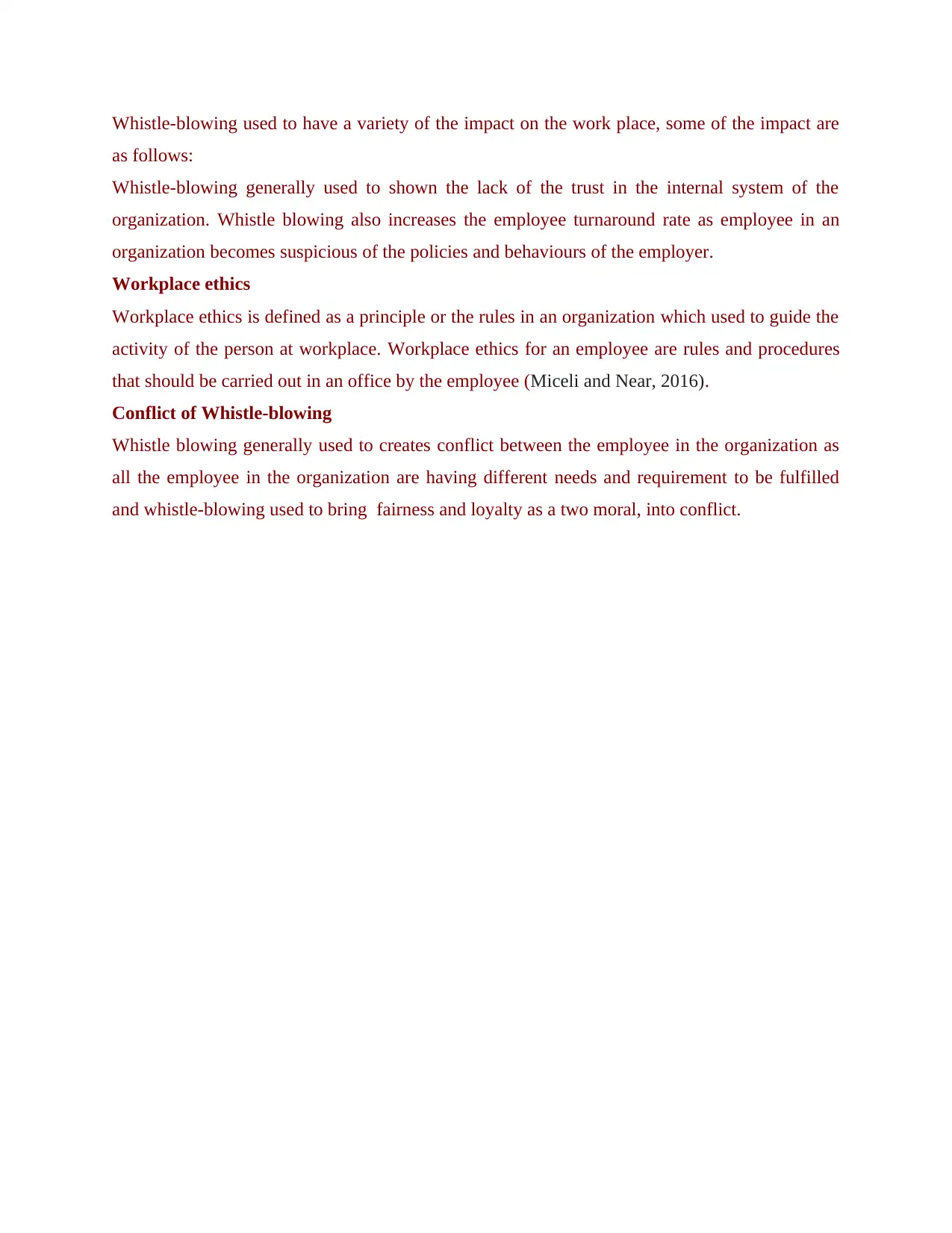
Whistle-blowing used to have a variety of the impact on the work place, some of the impact are
as follows:
Whistle-blowing generally used to shown the lack of the trust in the internal system of the
organization. Whistle blowing also increases the employee turnaround rate as employee in an
organization becomes suspicious of the policies and behaviours of the employer.
Workplace ethics
Workplace ethics is defined as a principle or the rules in an organization which used to guide the
activity of the person at workplace. Workplace ethics for an employee are rules and procedures
that should be carried out in an office by the employee (Miceli and Near, 2016).
Conflict of Whistle-blowing
Whistle blowing generally used to creates conflict between the employee in the organization as
all the employee in the organization are having different needs and requirement to be fulfilled
and whistle-blowing used to bring fairness and loyalty as a two moral, into conflict.
as follows:
Whistle-blowing generally used to shown the lack of the trust in the internal system of the
organization. Whistle blowing also increases the employee turnaround rate as employee in an
organization becomes suspicious of the policies and behaviours of the employer.
Workplace ethics
Workplace ethics is defined as a principle or the rules in an organization which used to guide the
activity of the person at workplace. Workplace ethics for an employee are rules and procedures
that should be carried out in an office by the employee (Miceli and Near, 2016).
Conflict of Whistle-blowing
Whistle blowing generally used to creates conflict between the employee in the organization as
all the employee in the organization are having different needs and requirement to be fulfilled
and whistle-blowing used to bring fairness and loyalty as a two moral, into conflict.
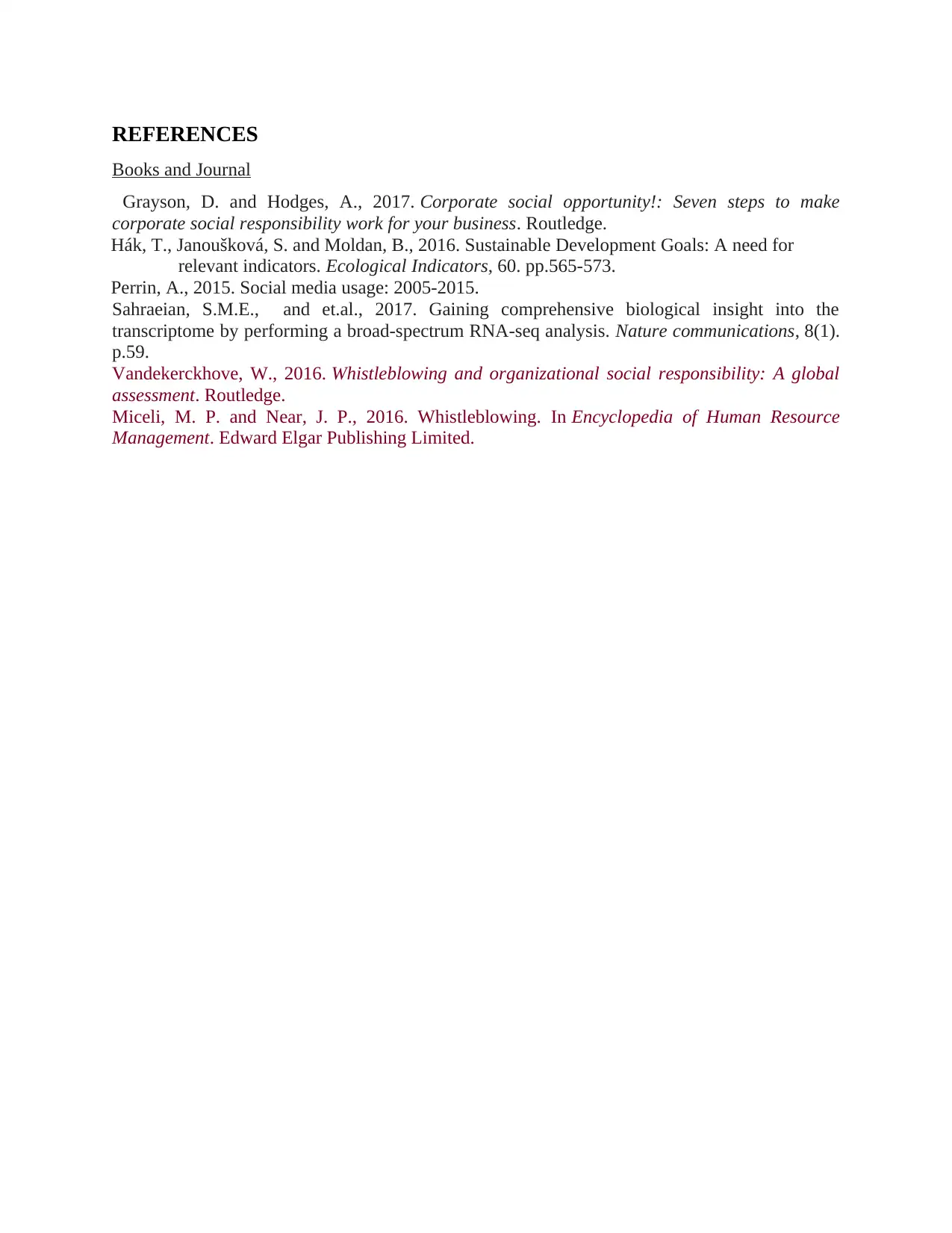
REFERENCES
Books and Journal
Grayson, D. and Hodges, A., 2017. Corporate social opportunity!: Seven steps to make
corporate social responsibility work for your business. Routledge.
Hák, T., Janoušková, S. and Moldan, B., 2016. Sustainable Development Goals: A need for
relevant indicators. Ecological Indicators, 60. pp.565-573.
Perrin, A., 2015. Social media usage: 2005-2015.
Sahraeian, S.M.E., and et.al., 2017. Gaining comprehensive biological insight into the
transcriptome by performing a broad-spectrum RNA-seq analysis. Nature communications, 8(1).
p.59.
Vandekerckhove, W., 2016. Whistleblowing and organizational social responsibility: A global
assessment. Routledge.
Miceli, M. P. and Near, J. P., 2016. Whistleblowing. In Encyclopedia of Human Resource
Management. Edward Elgar Publishing Limited.
Books and Journal
Grayson, D. and Hodges, A., 2017. Corporate social opportunity!: Seven steps to make
corporate social responsibility work for your business. Routledge.
Hák, T., Janoušková, S. and Moldan, B., 2016. Sustainable Development Goals: A need for
relevant indicators. Ecological Indicators, 60. pp.565-573.
Perrin, A., 2015. Social media usage: 2005-2015.
Sahraeian, S.M.E., and et.al., 2017. Gaining comprehensive biological insight into the
transcriptome by performing a broad-spectrum RNA-seq analysis. Nature communications, 8(1).
p.59.
Vandekerckhove, W., 2016. Whistleblowing and organizational social responsibility: A global
assessment. Routledge.
Miceli, M. P. and Near, J. P., 2016. Whistleblowing. In Encyclopedia of Human Resource
Management. Edward Elgar Publishing Limited.
⊘ This is a preview!⊘
Do you want full access?
Subscribe today to unlock all pages.

Trusted by 1+ million students worldwide

Paraphrase This Document
Need a fresh take? Get an instant paraphrase of this document with our AI Paraphraser

1 out of 8
Related Documents
Your All-in-One AI-Powered Toolkit for Academic Success.
+13062052269
info@desklib.com
Available 24*7 on WhatsApp / Email
![[object Object]](/_next/static/media/star-bottom.7253800d.svg)
Unlock your academic potential
Copyright © 2020–2026 A2Z Services. All Rights Reserved. Developed and managed by ZUCOL.





